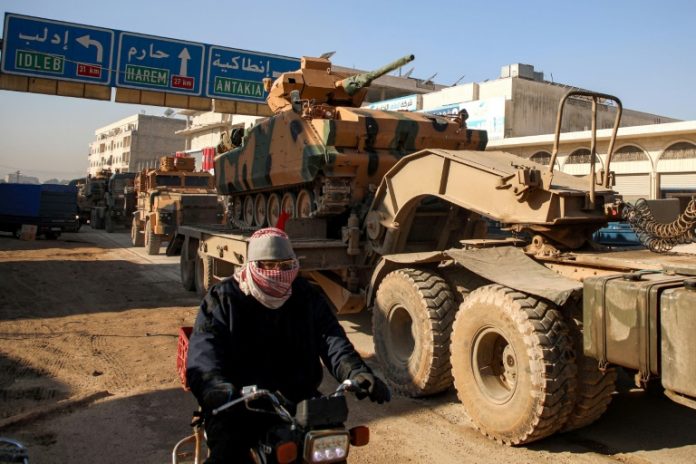Turkish and Syrian troops traded deadly fire in Syria’s northwest on Monday, further raising tension between Ankara and regime backer Moscow over the war-torn Idlib rebel enclave.
An air strike also killed at least nine civilians in the same area, where the latest government offensive has caused one of the nine-year-old Syrian conflict’s worst waves of displacement.
The tit-for-tat shelling between Damascus and Ankara was the deadliest since Turkey deployed troops in Syria in 2016 and escalated tensions between the conflict’s two top foreign brokers.
Turkish President Recep Tayyip Erdogan offered rare criticism of Russia last week, accusing it of “not honouring” agreements to prevent a regime offensive on the northwestern region of Idlib.
The overnight exchange began with regime shelling on Turkish positions in Idlib, according to the Syrian Observatory for Human Rights, a Britain-based war monitor.

The attack killed four Turkish soldiers and wounded nine others despite previous coordination on where Ankara’s forces would be in the region, Turkey’s defence ministry said.
The Russian defence ministry said Ankara had failed to give prior warning of its troop movements at the time of the incident.
Retaliatory rocket attacks by Ankara on regime positions later killed at least 13 Syrian government troops and wounded 20 others in Idlib and the neighbouring provinces of Hama and Latakia, the Observatory said.
Syrian state news agency SANA said the Syrian army had not suffered any casualties.
Speaking to reporters at an Istanbul airport before leaving for Ukraine, Erdogan called it an “ongoing operation,” and said that 30 to 35 Syrian forces were “neutralised” in the counterattack that targeted 40 locations.
He said it was not possible for Turkey to “remain silent” when its forces were being killed, warning Russia not to stand in the way of its response.
A senior Turkish official said that the regime attack on Turkish troops and the government offensive in general were conducted “with Russian protection”.
“Russia should remove this protection from the regime elements which attack Turkish forces in this region,” ruling party spokesman Omer Celik told CNN Turk.
“Our target is not Russia,” he said. “The regime in this region after this attack is a target for us.”
The violence in Idlib has displaced more than 388,000 people since December, according to the United Nations, forcing many of them towards Turkey’s border.

UN Secretary-General Antonio Guterres on Saturday called for an end to fighting but air strikes, many of them carried out by Russian aircraft, have continued.
On Monday, at least nine civilians were killed in an air strike on northwest Syria where similar raids a day earlier had killed 14 civilians, according to the Observatory.
Monday’s casualties were all displaced people who died when a missile hit their car, the Observatory said, without specifying the origin of the strike.
They died leaving a flashpoint region in Aleppo province, located in the Idlib region’s eastern flank.
The regime now controls more than two thirds of Syria, up from a barely a fifth before Russia’s military might came to the rescue in 2015.
A jihadist group led by members of Syria’s former Al-Qaeda affiliate still controls swathes of territory in and around Idlib province home to some three million people and pro-Ankara rebel groups are also present.
In recent months, pro-Damascus forces have pressed northwards along the M5 highway that connects the capital to second city Aleppo in the north, crossing Idlib.
Government forces last week retook the key town of Maaret al-Numan along the highway and are now just a few kilometres from the abandoned town of Saraqeb.
A Turkish-Russian deal in 2018 saw Turkish troops deploy at observation posts around Idlib, but the agreement has failed to stem repeated regime military offensives.
Syria’s Deputy Foreign Minister Faisal Mekdad accused Turkey of thwarting a solution to the conflict in his country.

In comments published by the pro-government Al-Watan newspaper on Monday, he accused Ankara of working against agreements brokered to prevent an escalation in the civil war.
On Sunday morning, an AFP correspondent and the Observatory said a Turkish military convoy of hundreds of vehicles entered northern Syria, deploying in Idlib and neighbouring Aleppo province.
Half of the Idlib region’s residents have been displaced throughout the war, with many living in precarious shelters in the countryside along the Turkish border.
Ankara — which already hosts more than three million Syrian refugees on its soil – fears the latest fighting will lead to another mass influx.
On Sunday, hundreds of Syrian men, women and children marched towards the border in a symbolic protest, demanding to be allowed through.
Syria’s civil war has killed more than 380,000 people since it started in 2011 with the brutal repression of anti-government protests.
















